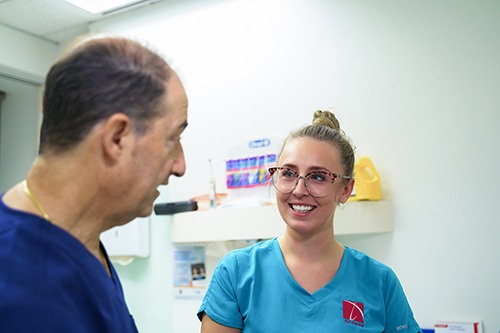Getting Rid of Bad Breath at Your Local CBD Dentist
We often notice bad breath at the worst of times. Perhaps you have a job interview and went for a quick breath against your hand. Maybe your date is on the way, or your crush wants to meet after school.
Whatever the occasion, you’ve come to find that your breath isn’t exactly minty fresh. In fact, it’s downright disgusting.
In the good old days, a quick tab of gum or swish around of mouthwash did the trick. But if you notice those time-tested tricks just aren’t doing the job, you might be experiencing halitosis, a chronic case of bad breath not easily subdued by regular oral care. In fact, halitosis is a fickle beast and often persists despite your best attempts to brush and floss daily.
This often embarrassing ailment can be caused by a myriad of factors, but often boils down to issues from bacteria that a regular cleaning just can’t reach.

| Monday | 8:00AM – 6:00PM |
| Tuesday | 1:00PM – 7:00PM |
| Wednesday | 8:00AM – 6:00PM |
| Thursday | Closed |
| Friday | 8:00AM – 5:00PM |
| Saturday | Closed |
| Sunday | Closed |
What Causes Bad Breath? (Halitosis)
Let’s be clear: Halitosis is not your fault. Poor dental hygiene can lead to its development, but so can a lot of other factors (some of which are out of your control). You can employ the best dental hygiene techniques on the regular and still end up with halitosis. It’s not fair…we know.
The good news is that we can help. But first, let’s learn a little more about this nasty oral issue.
So, what else causes Halitosis? The truth is, quite a few things can be behind this embarrassing issue.
For the sake of this page, we’ll focus on the top five causes:
Bacteria. Bacteria from cavities, gum disease, or poorly fitted fillings can fester and lead to foul odour. Professional cleaning is needed to eradicate this underlying cause, and potentially the need for new fillings or a crown to protect your teeth in the future.
Chronic Conditions. Diabetes, chronic gastrointestinal issues, liver or kidney disease…all of these and more can lead to a symptom of halitosis. Treatment is available to reduce this effect; in fact, TLC Dental can discuss the effect of chronic conditions on your oral health and recommend helpful treatments.
Dry Mouth. Proper oral health and dental hygiene are, to a large extent, reliant on your saliva. Unfortunately, there are times when our bodies don’t produce enough. While staying hydrated can help, dry mouth can also be a chronic condition that requires a dentist’s intervention.
Infections. Soft tissues in your mouth, such as gums and tongues, can become infected, leading to Halitosis. Further, mucous from post-nasal drip can become a bacteria breeding house. If Halitosis persists after your cold, flu or nasal infection goes away, you should come to see us for an exam.
Substances. Your oral health is not immune to the potential negative effects of alcohol, tobacco, and caffeine can have on your body. These substances can lead to Halitosis in addition to discolouration and plaque build-up.
And to think, these are just the top five! If your Halitosis persists despite your best efforts to remedy it on your own, it’s time to come see our team and find the underlying cause.
Preventing Stinky Breath
Most at-home routines are surface-level when it comes to Halitosis treatments, but they can help and prevent your Halitosis from developing into a more severe condition— for instance, preventing gingivitis from progressing to periodontal disease.
- Brush and Floss — This is easily the best step in preventative oral care. Daily brushing and flossing can help reduce the buildup of plaque and bacteria, and flossing can help keep food from festering when trapped alongside your teeth. However, it should be noted that daily oral care does not replace a good professional cleaning, but it can help keep your mouth healthy in-between dental visits.
- Clean Your Tongue — When brushing and flossing, it’s imperative that you don’t skip a good scrub of the tongue. Brush all the way to the back to keep bacteria from building up on the soft tissue.
- Eat Healthy — Your diet plays an important role in your health, including your oral health. Certain foods can cut back on bacteria in your mouth, don’t run the risk of discolouration, and can help prevent colds and the like that lead to Halitosis.
- Stay Hydrated — We touched on this discussing dry mouth, but proper hydration is essential with good oral hygiene. Not only does water help keep your mouth moist, it can also help rinse out bacteria, stuck food bits, and wash off the surface of your teeth.
- Stop Using Substances — Alcohol and tobacco especially are known for their effect on oral health and hygiene. Caffeine is also an offender. Stains, tooth decay, bacterial build-up, and more can be direct results of these in addition to other health concerns.
- Use Mouthwash — Rinsing with mouthwash between visits is extremely beneficial. They all have special ingredients that specifically target bacteria in the mouth. Rinse can also fit into tight spaces where your regular toothbrush doesn’t quite cut it.
Treatment Options
At TLC Dental, we understand the hassle of Halitosis; we want to help you find the best solutions that will leave your breath smelling fresh. Our licensed dentists and caring staff are standing by to get to the bottom of your chronic bad breath so that you can get back to your regular schedule.
Give us a call today, and our friendly staff will get you started on the path to a happier, healthier mouth.
